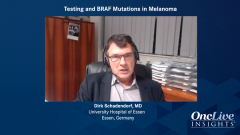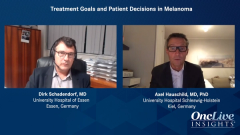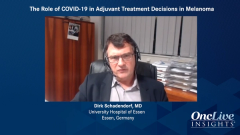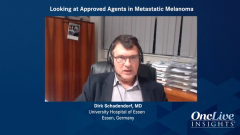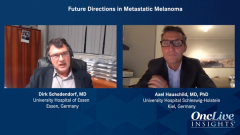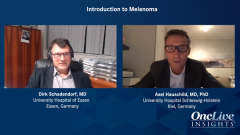
The Role of COVID-19 in Adjuvant Treatment Decisions in Melanoma
Episodes in this series

Axel Hauschild, MD, PhD: Let’s switch to a brief discussion at the end of the adjuvant section of our discussion on COVID-19 [coronavirus disease 2019].
What has changed in your center the University Hospital of Essen? Keep in mind that the NCCN [National Comprehensive Cancer Network] guidelines were recommending the use of more of the BRAF-directed treatments because of the comorbidities going along with new checkpoint inhibition that may require immunosuppressive treatment or eventually, in rare cases, immune checkpoint inhibitors may stimulate a cytokine storm syndrome.
Did you switch your BRAF-mutated patients more to dabrafenib/trametinib rather than the PD-1 antibodies?
Dirk Schadendorf, MD: This recommendation reflects some of the insecurities, especially in early 2020 in the first wave of COVID-19. At that time, a lot of clinical trials stopped recruitment because there was no clear idea whether there would be any interference with that.
The numbers are now much higher than they were in spring and early summer. There is now a certain routine now at all the centers. We have to protect ourselves. We have to protect our patients. That’s true, but it’s also important to keep this in mind because there was also some recommendation to postpone tumor surgery. There was also some reluctance to start adjuvant treatment. This is definitely not warranted. Cancer is a deadly disease, much more deadly than COVID-19 in most settings.
The concern is that the patient with cancer, who is potentially immunosuppressed or has other comorbidities, is getting COVID-19 on top. That is obviously an important educational point for the patient to take care of. You have to make sure. It may be part of the reflection about bringing patients back to the hospital, for traveling and all of that.
If it is possible to prevent that, an oral drug could be a better choice, for example. That’s a good thing, but the cytokine storm and all of that, that’s not relevant in most of the cases.
Axel Hauschild, MD, PhD: That’s good. We have a publication in process on immune checkpoint inhibitors, particularly in melanoma, which showed no clear increase in the death rate when they were used. We also have prolonged the intervals for the application of immune checkpoint inhibitors because different intervals are approved, so we can go for the long intervals.
Transcript Edited for Clarity


